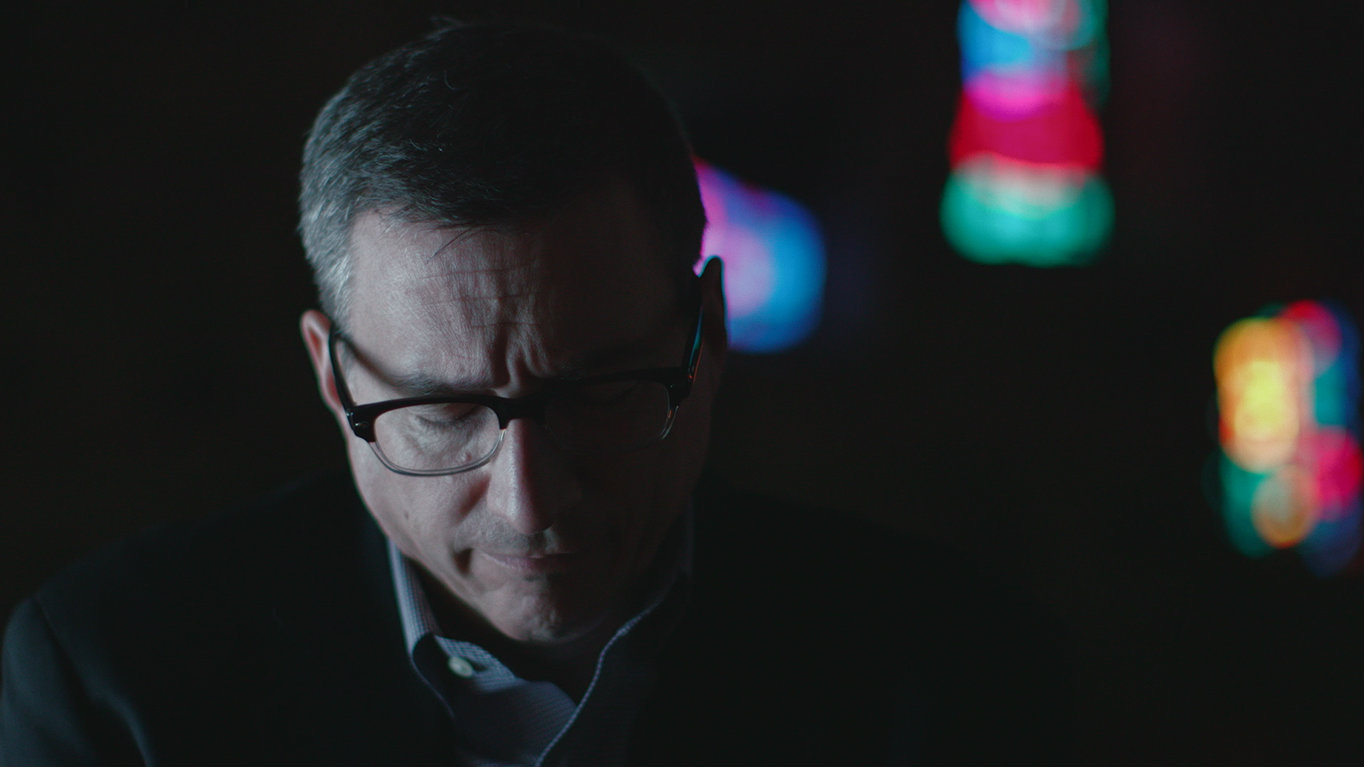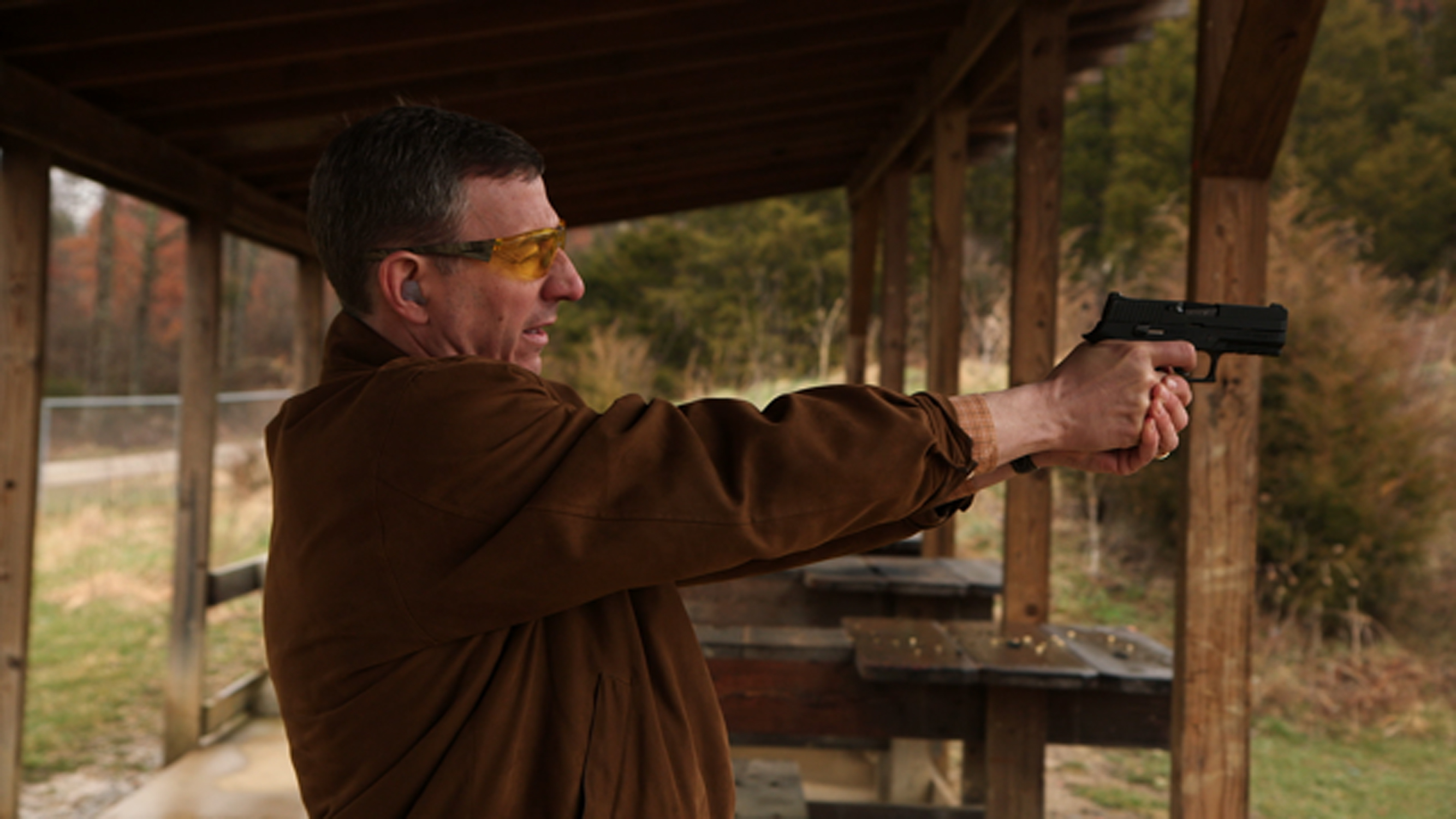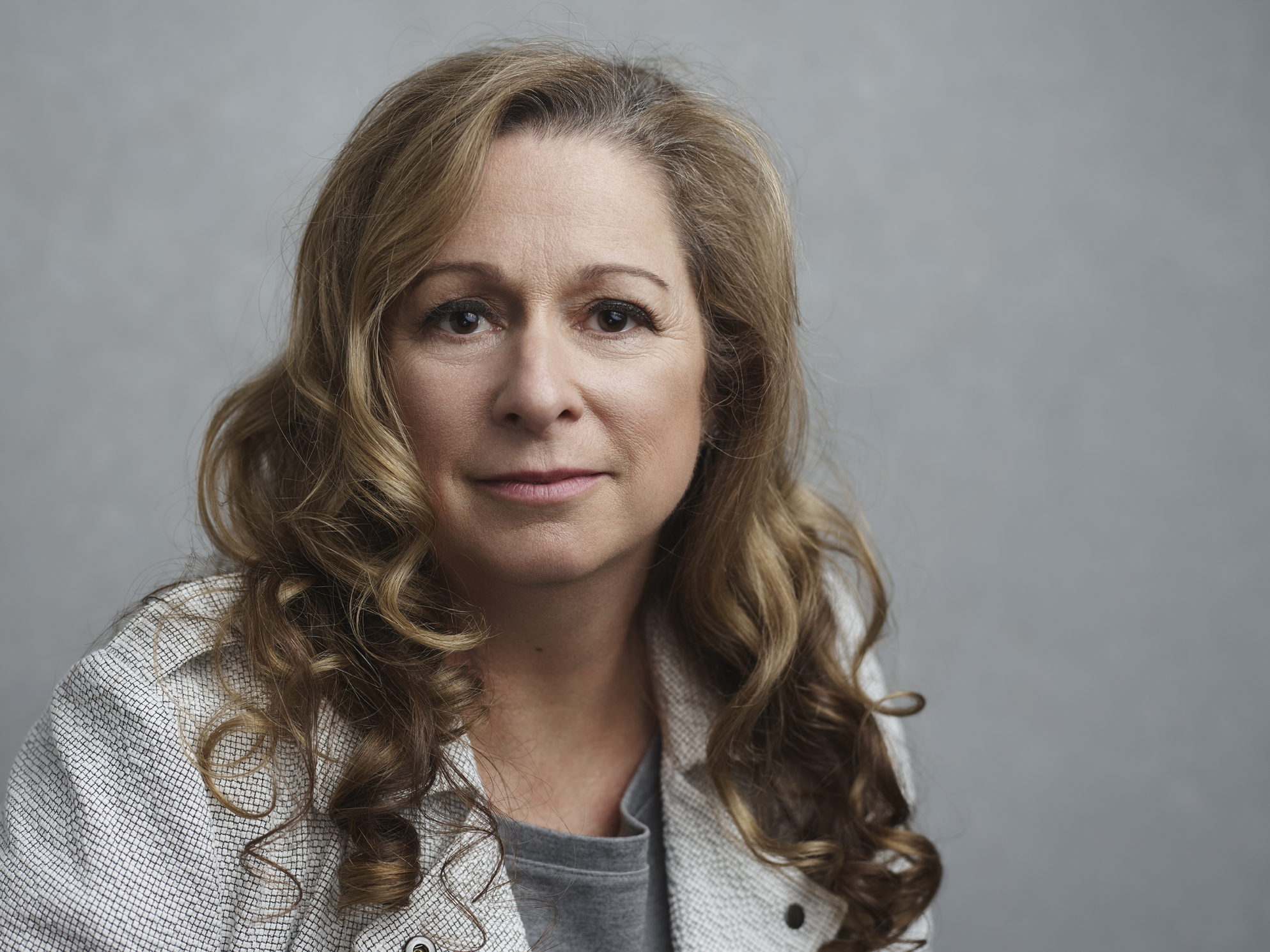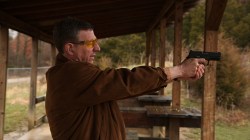 Jeff Hutchens
Jeff HutchensThe Armor of Light first started making the festival circuit in spring 2015, but since then the documentary—which confronts the gun policy debate in the context of American evangelicalism and the pro-life movement—has only become more relevant. Director Abigail Disney describes herself as a “pro-choice feminist,” but she grew up around her family’s conservative politics (yes, those Disneys—Walt was her great-uncle) and her interest in the issue sparked the film’s genesis.
The film (which takes its name from Romans 13:12) follows Rev. Rob Schenck, perhaps best known for his deep involvement as a pro-life activist in the early 1990s. Today, Schenck is president of Faith and Action in Washington, D.C. and chairman of the Evangelical Church Alliance. Following a mass shooting event that took place not far from his home, Schenck began to seriously wrestle with his own views on gun violence and policy and its relationship to his firm position on abortion – is it possible to be both pro-gun and pro-life? He meets Lucy McBath, a Christian woman whose unarmed teenage son Jordan Davis was shot and killed. Davis’s case is now a major part of the ongoing debate over Florida’s “Stand Your Ground” laws. A friendship develops between them, prompting Schenck to initiate a series of conversations around the country with evangelical leaders, questioning whether being pro-gun and pro-life are compatible positions.
I saw the film last April at the Tribeca Film Festival, in a room full of New Yorkers, and wrote about it in my festival round-up. It’s a challenging film. Sometimes, it’s uncomfortable. I can’t imagine anyone, regardless of their beliefs, leaving the theater without something to seriously consider. And though The Armor of Light is undeniably well-made and compelling, what startled me most is its incredibly sensitive and nuanced portrayal of Schenck and other evangelicals with whom he interacts.
I was delighted to talk to Abby Disney and Rob Schenck, who remain grounded in their respective (and opposite) political views – Disney is still a pro-choice feminist, and Schenck is still a pro-life evangelical – but whose friendship and mutual respect for one another is palpable even over the phone. (What follows was edited slightly for clarity.)
The Genesis of the Project
Christianity Today: How did you two get involved with this project?
 Joey L.
Joey L.Abigail Disney: I had heard about the gun issue for a really long time and I was thinking about what would be the way to get people talking and thinking about this issue—in a way that wouldn’t inflame people, but would get them talking with each other. That would inflame the conscience and feel like a new contribution to the ideas. All we’re doing is going around and around and around about the same four to five ideas.
Evangelical Christians in the pro-life movement generally have a view about sanctity of life which I think is beautiful—even though I’m a pro-choice feminist myself, I support life. I really did wonder how that could stand side by side with the gun discourse, which is so casual about the gun itself—even about the language of taking human life; I call it the yippee-kai-yay culture. I don’t understand how those two things line up, so I went looking for people to talk to.
I talked to three or four other people before talking to Rob [Schenck]. Rob was someone who really heard me, and really heard what I had to say. Obviously, he was more nuanced than I was. And it really in one conversation, his ears perked up. He recognized that there was an inconsistency, and that this was important. So, based on that conversation, a much larger conversation started with the film.

Rob Schenck: I should add that this wasn’t the very first time that I had recognized the contradiction between the values that so many evangelicals hold on the sanctity of life and the stand they take on the use of guns for personal defense. In my mind, there’s a nuanced difference between someone who uses a gun for hunting and sportmanship; it’s in a different category than someone who has a gun and thinks about using it to kill or maim another human being. It’s a different ethical question.
So, it had crossed my mind in a fleeting way. In the film, we had an experience with an Amish family in Pennsylvania that had raised questions in my heart and mind, but I gave it no special attention. I sort of compartmentalized it. It belonged in a different space than my questions about the sanctity of nascent human life.
That’s how I lived with it until Abby proposed it as a careful examination in this film. It seemed very necessary—important to me by the end of this conversation, but very frightening. I knew the universe of my constituents and polled them, about roughly 100,000 people—and 95% align with the NRA’s position on guns and unfettered 2nd Amendment rights.
I knew that people inside the organization were telling me to not broach the subject, to not consider it. So, it took me some time, five or six weeks, to work that through, prayerfully and internally. To take it under advisement inside my organization and outside of it. Finally, I talked to a prominent conservative Christian personality who said, “If this is truly your conviction, you should go public with it.”
That was my final permission to take the risk, and it’s proven to be fairly risky. Not in the way I expected, but certainly there’s been a downside in it.
CT: You’re worried about losing resources and constituents, right?
RS: Right. And we’ve registered some loss already. We’ve had a few major donors who have said that they will not support our organization any more or me. But really, the loss that concerned me the most were friendships. I have deep friendships of twenty and thirty years, and I am losing some friends over this. And I will lose more. For me, that is the biggest price to pay.
Friendship and Choosing Peace
CT: Friendship is a big part of this film; real progress in public life happens through friendship. Did anything surprise you about friendship as you engaged with this issue?
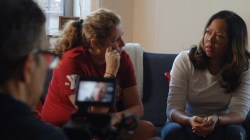 Eva Anisko
Eva AniskoRS: First of all, if you had asked me a decade ago if I would have the friendship I do with a pro-choice, left-leaning feminist—certainly a very progressive feminist activist who supports a lot of organizations that I’ve been an opponent of for thirty years now—I think I would have been open to it. But I would have had no idea as to how it would come about as it did. I consider it a very generous gift from God to have a frienship with Abby; it gives me a perspective on many things that I would not have had, if it weren’t for our friendship.
CT: What kind of perspectives?
RS: To begin with, the gun question, of course. This is a question of paramount ethical and moral concerns for me and for others. It’s a big question for the evangelical church and the church as a whole—our society. I would not have taken that out of my secret heart box without Abby’s gentle prodding. That’s a consquence of our professional collaboration and our friendship.
Also, if you had asked me three years ago if I had really cared about women who are part of the abortion question, I would have said yes. But it would have been theoretical. I really didn’t care, and that’s a very important realization.
In talking to Abby, I realized something tangential in the equation: the person I describe as the mother of the child, the person who pays the greatest price for the abortion, I saw as just a secondary factor. That’s just a form of contempt. I had to admit that myself I hadn’t completely resolved it. And that’s another gift from Abby.
But probably the biggest one I’ve received from Abby is changing my stereotyping of progressive activists. I always tried to manage that, and I wasn’t successful, but I’m almost there due to my friendship with Abby. I’m a more whole person and truer to the gospel. Christ maintained his hold on the truth but also did not have any contempt for those around him. I want to be more Christ-like, and Abby is helping me to be more Christlike.
CT: Wow. That’s great.
AD: Wow, that is great! I would never imagine that a friendship would have come up like this. I may have walked into the first meeting viewing Rob as anti-woman. Maybe I wasn’t as interested in him as I was in what he was carrying with him. But I felt almost like “Wait, we speak similarly—how is that possible when we’re on the opposite sides of things? How is it possible that we think alike?” That’s a revolution, when you realize that.
After all my conflict resolution classes, studying women in the peace movement, I realized that peace is all about relationships. It doesn’t just happen. You have to choose it; you have to make it. It’s been the most pleasant surprise to find a friend in the midst of all this.
CT: The Armor of Light is kind of a unique film, in that it presents evangelicals as intelligent, smart, relatable, and principled. How did you approach that challenge?
AD: Rob told me about how he came from a progressive, even liberal family. And I totally related. We’ve had those similar Thanksgiving dinner-table experiences, where you learn to carry love in your heart for someone you truly disagree with. Not a lot of us do that.
RS: That’s why, while I consider friendship with Lucy [McBath] to be of great importance and value in every way, it’s very different: Lucy and I come from the same faith realm. Lucy is a born-again Christian, even if we disagree on the pro-choice question. That was another friendship that came out of this project. And really, it was Lucy pulled me across the decision line. That’s an important relationship to me.
 Jeff Hutchens
Jeff HutchensCT: You can see that in your conversation with her in the film, when she’s pleading with you to consider what’s at stake with the issue of guns. I saw the film months ago, but that part really stuck with me.
Why Make a Movie?
CT: Lots of people have written books and articles on this very subject, but you made a film instead. What do you think is the value of using the medium of film? What about film itself makes it an effective way to explore this issue?
AD: I grew up in a filmmaking family, of course, so I thought about the medium. You think you can fit so much into a film—but you really can’t. Films aren’t about information. The most effective documentaries are stories. They're like a ride: you have to get on and let it take you where it wants to take you. Think about how you feel in a dark theater, when you're not even conscious of your physical body—it’s like a dream starts. Your heart opens up during a good film in a way that’s so powerful. It’s not persuasion; it’s something more. It’s a holy power, a holy gift to do that, and I hate seeing it used for stupidity.
I’ve been writing, I’ve been speaking, I’ve been trying to be a persuader for all of my life, to change the way people think. Then I made a film in my late 40s and thought, “Why wasn’t I doing this all of my life?” So, of course it had to be a film, and maybe a book, and possibly more. But we start with the film, because it engages the user’s moral and creative imaginations.
At the same time, we had the potential to make a really boring film. If it’s all too much in your brain, it’ll fail. So we had to find a way to get people to really respond and feel everything, to respond with an emotional and conscious response. That took a lot of good cinematography. We paid a lot of attention to how it was shot. As important as emotional response is, the beauty of the film will also invite you in, as will the editing and the music. It’s meant to wrap people up with whatever beautiful blanket you want to wrap them up in. We were really proud that we were able to do that.
RS: You know, a few times along the way, Abby alluded to the feeling that some things were being orchestrated and delivered to the project. I like to think of that as providential. Abby, I don’t think you were conscious of Jeff’s [Hutchens, the film’s cinematographer] family background, were you?
AD: Not at all!
RS: Our primary cinematographer had had deep evangelical roots, even though he doesn’t identify as an evangelical. Abby had a very expansive, generous attitude towards evangelicals, and Jeff thoroughly understood the culture, so he effectively moved through the scenery. Not only was he fully knowledgeable about that culture, he was fully comfortable in that setting. I think it added something.
On Fear
CT: A few weeks ago, Marilynne Robinson wrote about Christianity and fear for the New York Review of Books: "First, contemporary America is full of fear. And second, fear is not a Christian habit of mind." President Obama read the piece and went to Iowa, and there they had a conversation about fear, guns, and a lot more. What do you think about that statement—and as you travel around the country talking to evangelical leaders, Rob, do you see fear as the primary factor in the conversation?
 Jeff Hutchens
Jeff HutchensRS: I have not yet read the piece, but from what you said, I applaud [Robinson] for pointing out the problem of fear; if it’s not the central problem, then it’s very close to the central problem. Fear, in many ways, is the antithesis of faith. Faith inspires confidence and personal security. It doesn’t happen instantaneously—fear is human, and it’s natural. Jesus experienced it in his humanity, in the Garden of Gethsemane.
We’re never going to vanquish fear, but we need to identify it for what it is. I believe its presence, in such a pronounced way, in the evangelical community is because of fearmongering that’s been happening for the last twenty years, on a mass scale. If it isn’t a massive prediction about the end times and prophecy, it’s the fixation with persecution—which we know almost nothing of in this country; there’s a lot of talk of persecution and comparing persecutions, but if you compare us with other countries, it’s no such thing here. It’s an imagined state, and it doesn’t really exist.
But people literally profit from it. I know this because of my own personal experience. When we raise funds for our organization, we hear that the best way to raise money is to instill fear and anger. If we can get people angry, we will raise more money. It’s not just done in the Christian world, not just in conservative fundraising—it’s everywhere! Literally billions of dollars are raised by this tactic of fear and anger.
Fear doesn’t just help people raise funds. It also builds audiences, whether it’s readership, listenership, or viewership. If you make someone afraid, you will get their attention in a very unique and effective way.
This has been fostered for a long time, and it goes right back to the gun question. Why are Christians arming up? They are afraid that someone is coming for them. I even know of some pastors who are carrying (guns) onto the pulpit. One of them told me, “If somebody comes into my church and tries something, they’ll regret it, because I’ll take them out straight from the pulpit.”
That kind of thought introduces a huge problem for the testimony of the Gospel, but that’s all driven by fear. And fear is driven by other elements. Fear of the other is the fuel. But as Jesus tells us many times, the Gospel is the antidote to fear.
The Armor of Light is currently touring the United States (schedule at the website) and will be released theatrically on October 30.
Alissa Wilkinson is Christianity Today’s chief film critic and an assistant professor of English and humanities at The King’s College in New York City. She writes widely on pop culture and religion and is the co-author, with Robert Joustra, of How to Survive the Apocalypse: Zombies, Cylons, Faith, and Politics at the End of the World (Eerdmans, 2016). She tweets @alissamarie.

